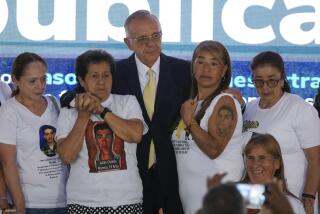Clinton ‘Regrets,’ Doesn’t Apologize for, No Gun Ri
- Share via
WASHINGTON — President Clinton expressed regret Thursday over the deaths of Korean civilians shot by retreating U.S. troops near the hamlet of No Gun Ri in the chaotic early days of the Korean War, but he stopped far short of the apology that many South Koreans have demanded.
“On behalf of the United States of America, I deeply regret that Korean civilians lost their lives at No Gun Ri in late July 1950,” Clinton said in a written statement that avoided any specific acknowledgment of responsibility for the killings.
However, Defense Secretary William S. Cohen said at a news conference that an exhaustive investigation showed that U.S. soldiers had fired into a crowd of refugees as they cowered under a railroad bridge, killing and wounding an undetermined number.
In addition to Korean survivors, Cohen said, investigators interviewed more than 150 U.S. citizens and examined more than 1 million documents. Although the U.S. inquiry did not determine the number of casualties, officials said the figure was far less than the 300 deaths claimed by representatives of the South Korean victims.
A joint U.S.-South Korean statement, which also was issued Thursday, said, “In the desperate opening weeks of defensive combat in the Korean War, U.S. soldiers killed or injured an unconfirmed number of Korean refugees in the last week of July 1950 during a withdrawal under pressure in the vicinity of No Gun Ri.”
Clinton described the incident as “a painful reminder of the tragedies of war.” But he said the world should not forget that the U.S. and South Korean armies were fighting to repulse a North Korean invasion and to preserve South Korea’s independence.
The South Korean survivors immediately denounced Clinton’s statement.
“Any final report that does not deal with the responsibility of commanders has a serious defect,” Chung Koo Do, spokesman for the survivors group, said in Seoul, according to the Associated Press. “It can’t be construed as anything other than a Pentagon attempt to whitewash the massacre.”
Clinton announced that the United States will construct a memorial to commemorate all civilians killed in the war, not just the refugees who died at No Gun Ri. He said the United States will also establish a memorial scholarship “as a living tribute” to the victims. But he ruled out direct reparations to the families of those who were killed or wounded.
Cohen said the memorial will be built in the vicinity of No Gun Ri. A U.S. official said the South Korean Education Ministry will select winners of about 30 scholarships for study either in the United States or South Korea. Applicants are not required to have any connection to the wartime incident.
Cohen ordered a thorough investigation of the incident in September 1999, shortly after the Associated Press reported the deaths.
The joint U.S.-South Korean statement said the U.S. troops who fired at the civilians “did so either to control the refugees’ movements or because they believed they had received small-arms fire from those locations.”
“The Korean War was fought for a just cause,” Cohen said. “In the early weeks of the war, U.S. troops were young, undertrained and unprepared for the battle tactics of the North Korean forces. The sacrifices of the U.S. and South Korean soldiers who lost their lives in this fight for freedom on the Korean peninsula can never be forgotten.”
The process of drafting the president’s official response was extremely sensitive. Veterans organizations objected strongly to any suggestion of an apology. They insisted that no compensation should be offered.
However, Washington is in the midst of talks with Seoul about extending the agreement that governs the presence of tens of thousands of U.S. soldiers in South Korea. Officials said that some sort of statement of regret was necessary to avoid alienating the South Korean government.
“Although we have been unable to determine precisely the events that occurred at No Gun Ri, the U.S. and South Korean governments have concluded . . . that an unconfirmed number of innocent Korean refugees were killed or injured there,” Clinton said. “To those Koreans who lost loved ones at No Gun Ri, I offer my condolences.
“Many Americans have experienced the anguish of innocent casualties of war,” he added. “We understand and sympathize with the sense of loss and sorrow that remains even after a half a century has passed.”
At the same time, he tried to put the incident into a larger context: “As we honor those civilians who fell victim to this conflict, let us not forget that pain is not the only legacy of the Korean War. American and Korean veterans fought shoulder to shoulder in the harshest of conditions for the cause of freedom, and they prevailed. The vibrancy of democracy in the Republic of Korea, the strong alliance between our two countries, and the closeness of our two peoples today [are] a testament to the sacrifices made by both of our nations 50 years ago.”
The No Gun Ri incident occurred July 26-28, 1950, about a month after the North Korean invasion and just weeks after the first U.S. troops arrived on the peninsula.
More to Read
Sign up for Essential California
The most important California stories and recommendations in your inbox every morning.
You may occasionally receive promotional content from the Los Angeles Times.













